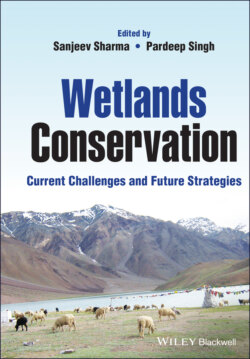Читать книгу Wetlands Conservation - Группа авторов - Страница 40
2.10 Legal Status
ОглавлениеIn the international context, the term “soft law” is applied to declarations, recommendations, and resolutions, etc., which are not legally binding for the signatories but often considered as sources of moral as well as political forces to help the application of allied, country‐specific laws when the need arises. Such soft laws might be nonjusticiable but they certainly can help in invoking the applicable hard laws or the legal instruments available within the legal framework of the signatory nations against the actions that are in violation of the convention (Verschuuren 2008).
The Ramsar convention, despite being a soft law, is supported at the national and local levels, by the legal framework meant for the protection and conservation of the environment, wildlife, and water resources, etc. In India, the Ramsar Convention draws strength from a host of laws that can be invoked in case of violations of the Ramsar Convention. Although India lacks a comprehensive National Wetland Policy, it does have Wetlands (Conservation and Management) Rules, 2010 (amended in 2017) which empower the country’s legal system against wetland conversion and degradation. Some of the laws which strengthen the implementation of the Ramsar Convention in the India include Indian Forest Act, 1927; Wildlife (Protection) Act, 1972; Environment (Protection) Act, 1986; Water (Prevention and Control of Pollution) Act, 1974; Forest (Conservation Act), 1980; Coastal Zone Regulation Notification, 1991; Wildlife (Protection) Amendment Act, 1991; Biodiversity Act, 2002; and National Environment Policy, 2006 (Pritchard 2009).
Similarly, various other countries have enacted laws the enable the conservation and wise‐use of wetlands as mandated under the Ramsar Convention. Although a soft law, the convention may, at times, act as a guiding light in making the right decisions with regard to large developmental projects. This may avoid unnecessary hassle and wastage of time and financial resources on such projects which might have severe implications for wetland ecosystems. There have also been instances where development projects challenged in the light of the Ramsar Convention were ultimately rejected. One such instance which has been widely written about is the construction of a resort on an island in the Netherlands. A private company, Crown Court Estate, planned to build a resort named “Mangrove Village” on the Island of Bonaire (one of the islands of the Netherlands Antilles). The project would be spread over an area of 44 150 m2 and some of its area falling within the boundary of a Ramsar site, the Lac/Sorobon wetland. The Governor of the island realized that the project was causing an infringement of Article 3 of the Ramsar Convention and the guidelines adopted in the Annex of Resolution VIII.9. The project was rejected by the Governor based on the argument that it breached the provisions of the Ramsar Convention (Verschuuren 2008).
